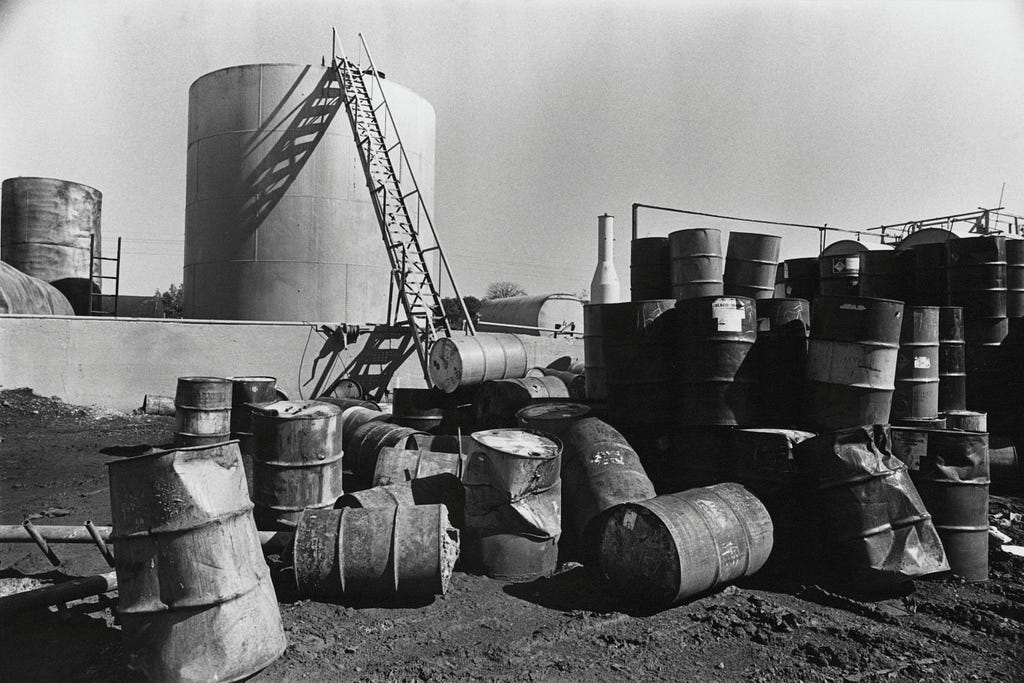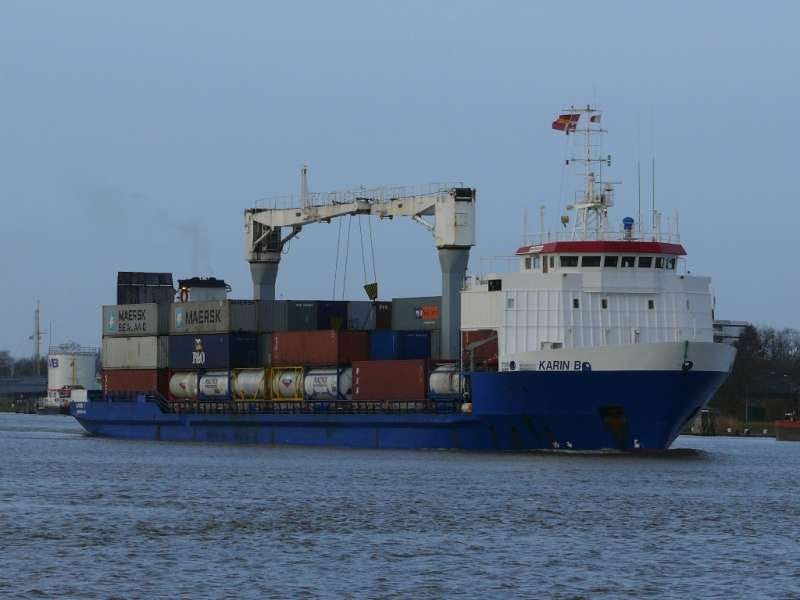In the 1980s, Italy paid a Nigerian town $100 a month to store toxic waste—and it’s happening again
Toxic colonialism at its worst

In the mid 1980s, Italy could only process 20 percent of the toxic waste it generated. The rest it quietly sent abroad. Why not, when you could pay a poor African community to store your dangerous chemicals?
The small fishing village of Koko, Nigeria, made international headlines in 1988 when it was discovered that two Italian firms had arranged for the storage of 18,000 drums of hazardous waste with Koko residents. The containers were disguised as building materials and offloaded into a local man’s vacant yard for $100 per month.
By the time Nigerian authorities identified the scheme, the drums were leaking and people were getting sick.
Nigerian students in Italy learned about the waste dump in Koko and alerted the media. In May 1988, The Daily Times, a government-run Nigerian newspaper, traveled to the tiny port town to investigate. There, in a vacant residential lot, reporters found “over 2,000 drums, sacks, and containers,” some of which were “identified with the letter R (the international symbol indicating ‘toxic and harmful industrial waste’). Many have already burst and are emitting a very offensive odor in the area.”
The lot’s owner, Sunday Nana, confirmed that he had agreed to let foreign importers use his land. He had initially asked for $200 per month, but negotiations settled at $100. Four shipments had arrived since the previous year, and more were coming.
The Nigerian government was shocked. Immediately, it ordered an Italian ship docked in Lagos to be seized and detained. Italian authorities responded by insisting the chemicals deposited at Koko were not harmful but merely coal tars, paint waste, and industrial solvents. But an independent analysis of the material by a British environmental group determined that 28 percent of the waste contained polychlorinated biphenyl (PCB), a combustible that could produce a highly toxic compound called dioxin.
Italy agreed to remove the waste. In mid-July, a barge called Karin B docked in Koko to collect the dented and leaky drums. Nigerian workers helped re-load 2,100 tons of chemicals. The ship departed for international waters on July 30. After it attempted to dock at four different European ports, crew members started complaining of chest pain.

For years, an Italian importer living in Nigeria, one Gianfranco Raffaelli, had managed to divert ships from their legal destinations to smaller port cities like Koko, where cargo inspections were forgiving or virtually nonexistent. It was Raffaelli who paid off Sunday Nana. When the story broke, he fled the country on June 2 without a passport, apparently able to bypass immigration at the airport in Lagos.
Nigeria was embarrassed. In the months leading up to the Koko story, its foreign minister, Ike Nwachuku, had denounced other African nations for accepting Europe’s waste products. In fact, he was at the United Nations in New York City asking for help shutting down exports to poorer states when the Koko dump was exposed. The emperor had no clothes.
But the government reacted swiftly. Not only did Nigeria demand that Italy remove the waste, it arrested at least 14 Nigerians involved in the smuggling and threatened them with a firing squad.
In June, authorities ordered 5,000 of Koko’s residents to evacuate. Land around the dump site was deemed unfit for use. Still, some residents refused to leave. “It’s not possible to move. This is our fathers’ land,” said David Okotie, the eldest son of Koko chief Kaka Olombu, who was blind and deaf. “All we want is that this poison be taken away immediately and the government bring in expert doctors so that the ill can be treated.”
Neighbors exposed to the toxic waste, which contained PCBs, dimethyl formaldehyde, and asbestos fibers, suffered nausea, paralysis, and premature births. Sunday Nana himself died of throat cancer. Even Nigerian Port Authority workers who helped transport the poison back onto the Italian ship walked away with chemical burns, despite having worn protective suits.
It would be 21 years of class action lawsuits against the Nigerian Port Authority before Koko residents saw any compensation. Ninety-four victims of the dumping were awarded a total of $264,666.
It was toxic colonialism, a phrase Greenpeace coined in 1992 to describe the “dumping of industrial wastes of the West on territories of the Third World.” More broadly, it was a cut-and-dry case of environmental racism, in which a wealthier, more powerful nation preyed on the vulnerabilities of a less-developed region.
“The toxic waste matter reeks full of the odor of corruption,” wrote the African Guardian. Nigerian magazine African Concord concurred. “That Italy did not contemplate Australia or South Africa or some other place for industrial waste re-echoes what Europe has always thought of Africa: A wasteland. And the people who live there, waste beings.”
Back at the docks in Koko, workers loaded 2,100 metric tons of toxic waste back onto Karin B. She set sail. The proposed destination was Ravenna, Italy. En route, however, the city rejected the cargo, claiming it would affect tourism.
Over the next month, Italy attempted to dock and offload the chemicals into other European countries. France, Britain, Spain, West Germany, and the Netherlands all refused permission to land.
‘’We do not want to accept a load of waste unless we know that our plants are able to treat it,’’ Thierry Cambrolle, director of pollution prevention for France’s Ministry of the Environment, told The New York Times. ‘’We do not know if our plants can process the waste because we have been unable to verify exactly what the waste is.’’ The French government urged Italy to repackage the leaky drums onboard and analyze the exact components of the waste before returning for help. In watchful distrust, French authorities continued to track the Karin B using a navy ship and tugboat.
Meanwhile, Italy instructed six of its own port cities to stay alert for instructions to take the cargo, whereupon the ports declared a state of “pre-alarm” and began trade negotiations to keep clear of the waste.
On September 3, facing increased pressure from international press and advocacy groups, the Italian Cabinet approved a decree that banned export of toxic chemicals to developing nations and limited future reliance on European Union countries for processing.
Nine weeks after leaving Koko, the Karin B finally received permission to land from Livorno, Italy. The voyage had become “a question of national dignity,” said Italy’s Environment Minister Giorgio Ruffolo.
In 1989, the U.N. designed an international treaty known as the Basel Convention, intended to prevent shipment and disposal of hazardous waste from industrial to developing countries, via a procedure of strict requirements and consents. Italy is a party; America never ratified the agreement.
Thirty years later, in February 2017, reports broke of another massive dump in Koko by an international oil company. According to Nigeria Communications Week, locals started noticing the waste coming in via barges and trucks months before. A source at the accused company, a Nigerian manufacturer called Ebenco Global Lint Ltd, insists it chose Koko as a simple “recycle” location. “This is sludge and it is not toxic; it is wealth to us because we are recycling them,” said the source, who went only by the name Ebenezer.
Nigerian lab tests allegedly prove the waste is toxic.
In the 1980s, Italy paid a Nigerian town $100 a month to store toxic waste—and it’s happening again was originally published in Timeline on Medium, where people are continuing the conversation by highlighting and responding to this story.
Powered by WPeMatico


